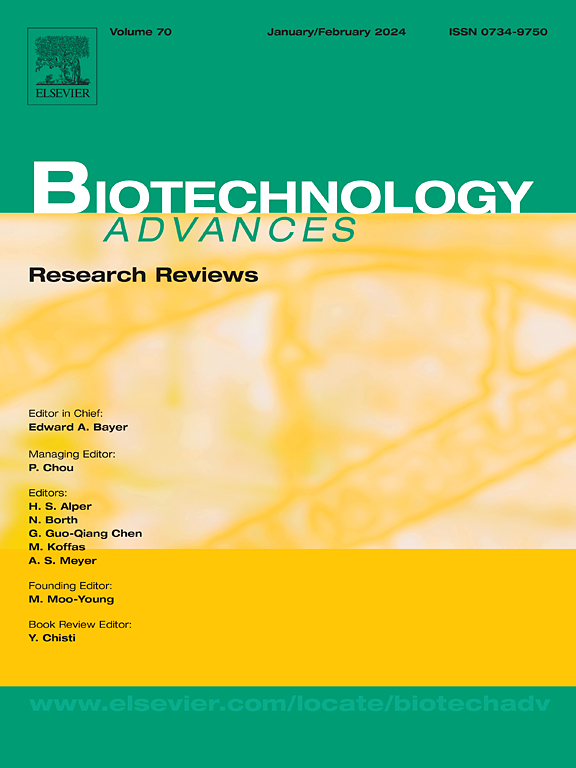为什么军方应该对生物医学技术感兴趣:可以改变战斗力的四个创新领域
IF 12.5
1区 工程技术
Q1 BIOTECHNOLOGY & APPLIED MICROBIOLOGY
引用次数: 0
摘要
生物技术是一个快速发展的领域,目前正在改变农业、医疗保健和生命科学。这种快速发展带来了严重的法律和道德挑战,也给人类安全和健康带来了风险。北约优先考虑生物技术和人类增强技术用于国防,重点是合法的防御应用。本文重点介绍了四组具有提高作战人员性能潜力的生物医学技术:具有响应能力的小型传感器:这些传感器已在民用医疗保健中用于葡萄糖监测和胰岛素剂量,可用于军事用途,在应对化学或生物威胁时施用解毒剂或抗生素。微生物工程:量身定制的益生菌可以为士兵的肠道微生物群做准备,以预防与旅行有关的疾病,而噬菌体可以用来对抗对抗生素有抗药性的感染。人机交互:神经控制论通过实现人与机器之间的无缝通信,正在改变军事机器人技术。组学和信息学:精准医学与机器智能相结合,可用于士兵的医疗筛查和监测,以及生物医学情报收集。这些技术在民用领域取得进展,在不久的将来(5-10年)具有增强军事能力的巨大潜力。监督和优先考虑人权对于确保负责任的应用、维护人的尊严、身体完整和个人自主权至关重要,即使在战时也是如此。随着全球军事创新系统在战略生物技术领域的发展,北约国家在这一激烈领域保持协同合作至关重要。本文章由计算机程序翻译,如有差异,请以英文原文为准。
Why the military should be interested in biomedical technology: four domains of innovation that could change fighting power
Biotechnology is a rapidly progressive field, currently transforming agriculture, healthcare, and life sciences. This rapid development comes with serious legal and ethical challenges as well as risks for human security and health. NATO has prioritized biotechnology and human enhancement technologies for defense, focusing on legitimate, defensive applications. This paper highlights four clusters of biomedical technologies with the potential to enhance warfighter performance:
- 1.Small-scale sensors with response capability: These sensors, already used in civilian healthcare for glucose monitoring and insulin dosing, could be adapted for military use to administer antidotes or antibiotics in response to chemical or biological threats.
- 2.Microbial engineering: Tailor-made probiotics could prepare soldiers' gut microbiomes to prevent travel-related illnesses, while bacteriophages, can be used to combat infections resistant to antibiotics.
- 3.Human-machine interaction: Neurocybernetics is transforming military robotics by enabling seamless communication between humans and machines.
- 4.Omics and informatics: Precision medicine combined with machine intelligence can be used for medical screening and monitoring of soldiers, as well as for biomedical intelligence gathering.
These technologies, progressing in civilian sectors, have significant potential to enhance military capabilities in the near future (5–10 years). Oversight and prioritization of human rights are essential to ensure responsible application, maintaining human dignity, bodily integrity, and personal autonomy even in wartime. As military innovation systems worldwide are advancing in strategic biotechnologies, it is critical for NATO countries to maintain synergistic intra-alliance collaboration in this intense field.
求助全文
通过发布文献求助,成功后即可免费获取论文全文。
去求助
来源期刊

Biotechnology advances
工程技术-生物工程与应用微生物
CiteScore
25.50
自引率
2.50%
发文量
167
审稿时长
37 days
期刊介绍:
Biotechnology Advances is a comprehensive review journal that covers all aspects of the multidisciplinary field of biotechnology. The journal focuses on biotechnology principles and their applications in various industries, agriculture, medicine, environmental concerns, and regulatory issues. It publishes authoritative articles that highlight current developments and future trends in the field of biotechnology. The journal invites submissions of manuscripts that are relevant and appropriate. It targets a wide audience, including scientists, engineers, students, instructors, researchers, practitioners, managers, governments, and other stakeholders in the field. Additionally, special issues are published based on selected presentations from recent relevant conferences in collaboration with the organizations hosting those conferences.
 求助内容:
求助内容: 应助结果提醒方式:
应助结果提醒方式:


